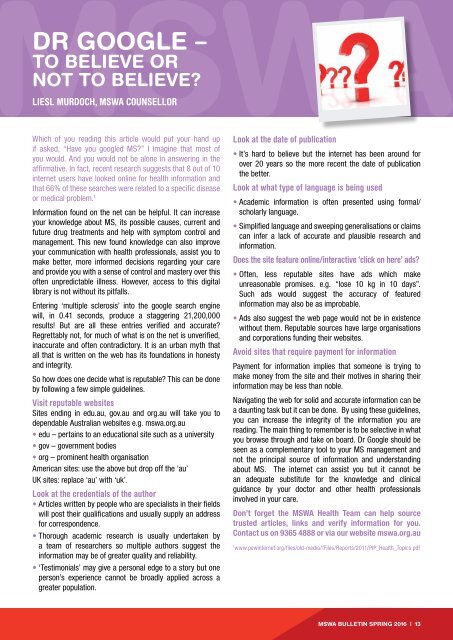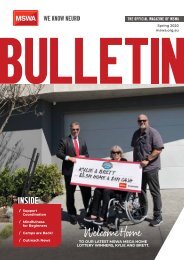You also want an ePaper? Increase the reach of your titles
YUMPU automatically turns print PDFs into web optimized ePapers that Google loves.
DR GOOGLE –<br />
TO BELIEVE OR<br />
NOT TO BELIEVE?<br />
LIESL MURDOCH, <strong>MSWA</strong> COUNSELLOR<br />
Which of you reading this article would put your hand up<br />
if asked, “Have you googled MS?” I imagine that most of<br />
you would. And you would not be alone in answering in the<br />
affirmative. In fact, recent research suggests that 8 out of 10<br />
internet users have looked online for health information and<br />
that 66% of these searches were related to a specific disease<br />
or medical problem. 1<br />
Information found on the net can be helpful. It can increase<br />
your knowledge about MS, its possible causes, current and<br />
future drug treatments and help with symptom control and<br />
management. This new found knowledge can also improve<br />
your communication with health professionals, assist you to<br />
make better, more informed decisions regarding your care<br />
and provide you with a sense of control and mastery over this<br />
often unpredictable illness. However, access to this digital<br />
library is not without its pitfalls.<br />
Entering ‘multiple sclerosis’ into the google search engine<br />
will, in 0.41 seconds, produce a staggering 21,200,000<br />
results! But are all these entries verified and accurate?<br />
Regrettably not, for much of what is on the net is unverified,<br />
inaccurate and often contradictory. It is an urban myth that<br />
all that is written on the web has its foundations in honesty<br />
and integrity.<br />
So how does one decide what is reputable? This can be done<br />
by following a few simple guidelines.<br />
Visit reputable websites<br />
Sites ending in edu.au, gov.au and org.au will take you to<br />
dependable Australian websites e.g. mswa.org.au<br />
• edu – pertains to an educational site such as a university<br />
• gov – government bodies<br />
• org – prominent health organisation<br />
American sites: use the above but drop off the ‘au’<br />
UK sites: replace ‘au’ with ‘uk’.<br />
Look at the credentials of the author<br />
• Articles written by people who are specialists in their fields<br />
will post their qualifications and usually supply an address<br />
for correspondence.<br />
• Thorough academic research is usually undertaken by<br />
a team of researchers so multiple authors suggest the<br />
information may be of greater quality and reliability.<br />
• ‘Testimonials’ may give a personal edge to a story but one<br />
person’s experience cannot be broadly applied across a<br />
greater population.<br />
Look at the date of publication<br />
• It’s hard to believe but the internet has been around for<br />
over 20 years so the more recent the date of publication<br />
the better.<br />
Look at what type of language is being used<br />
• Academic information is often presented using formal/<br />
scholarly language.<br />
• Simplified language and sweeping generalisations or claims<br />
can infer a lack of accurate and plausible research and<br />
information.<br />
Does the site feature online/interactive ‘click on here’ ads?<br />
• Often, less reputable sites have ads which make<br />
unreasonable promises. e.g. “lose 10 kg in 10 days”.<br />
Such ads would suggest the accuracy of featured<br />
information may also be as improbable.<br />
• Ads also suggest the web page would not be in existence<br />
without them. Reputable sources have large organisations<br />
and corporations funding their websites.<br />
Avoid sites that require payment for information<br />
Payment for information implies that someone is trying to<br />
make money from the site and their motives in sharing their<br />
information may be less than noble.<br />
Navigating the web for solid and accurate information can be<br />
a daunting task but it can be done. By using these guidelines,<br />
you can increase the integrity of the information you are<br />
reading. The main thing to remember is to be selective in what<br />
you browse through and take on board. Dr Google should be<br />
seen as a complementary tool to your MS management and<br />
not the principal source of information and understanding<br />
about MS. The internet can assist you but it cannot be<br />
an adequate substitute for the knowledge and clinical<br />
guidance by your doctor and other health professionals<br />
involved in your care.<br />
Don’t forget the <strong>MSWA</strong> Health Team can help source<br />
trusted articles, links and verify information for you.<br />
Contact us on 9365 4888 or via our website mswa.org.au<br />
1<br />
www.pewinternet.org/files/old-media//Files/Reports/2011/PIP_Health_Topics.pdf<br />
<strong>MSWA</strong> BULLETIN SPRING 20<strong>16</strong> | 13


















